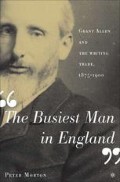Abstract
Allen got back from Hyères in May 1880. As we have seen, he had not idled his way through the months of recuperation. Indeed, in the month after his return there appeared in Fraser’s Magazine an article, “Geology and History,” which is a very typical and fine example of his early work. It explains how the agriculture, the manufactures, the arts, and even the religion of a society stands, quite literally and well as metaphorically, on its geology. Britain’s recent history was founded on coal; just as Egypt’s civilization was based on granite and Nile mud; Greece’s, on marble; China’s, on kaolin clay; Assyria and upper India’s, on sun-dried brick. He points out that the delicate tracery of English cathedrals would never have existed if the only building material had been ragstone or basalt. Fortunately, there was the limestone of Caen, Bath, and Portland to hand. For twelve pages Allen expands this notion with the most fluent and confident generalizations and a wealth of illustration.1 Still, he must have been only too aware by this time how hard it was to make a living wage by doing this kind of thing for the monthlies, and he must have been uncomfortable with the thought that he had no book on the stocks for 1880. But a big breakthrough, and something of a change of direction, came almost as soon as he was back. It was another opportunity with a newspaper, but work of a much more appealing kind than scribbling leaders or reviews for the Daily News.
Access this chapter
Tax calculation will be finalised at checkout
Purchases are for personal use only
Preview
Unable to display preview. Download preview PDF.
Notes
GA, “Geology and History,” Eraser’s Magazine for Town and Country, 21 (June 1880), 780.
GA, “Annals of Churnside. I.—King’s Peddington,” Pall Mall Gazette, 33 (January 31, 1881), 10–11; unsigned.
GA, “Springtide, North and South,” Pall Mall Gazette, 5 (April 1883), 4; unsigned. This article inspired a poem from the Laureate, Alfred Austin. See The Autobiography of Alfred Austin Poet Laureate 1835–1910, 2 vols., Macmillan, 1911, 11, 184.
So GA claimed in ZZ Richards, “Mr Grant Allen and His Work,” Novel Review, 1 (June 1892), 264. Actually there were at least three signed turnovers before Allen’s piece appeared on September 25, 1883. (One of these used a pen name.) Allen’s cowriter of turnovers for the Pall Mall, Aaron Watson, recalls Allen’s labors in A Newspaper Man’s Memories, Hutchinson [1925].
GA, “The Philosophy of a Visiting Card,” Cornhill Magazine, 46 (September 1882), 273–290; unsigned.
GA, “A Scribbler’s Apology,” Cornhill Magazine, 47 (May 1883), 542; unsigned.
Information on payscales from John Dawson, Practical Journalism, How to Enter Thereon and Succeed. A Manual for Beginners and Amateurs, L. Upcott Gill, 1885, 113. Another source quotes sixpence a line for the Pall Mall, which amounts to about the same for middles of the length that Allen contributed.
GA, “Rural America,” St James’s Gazette, 1 (October 1, 1880), 12–13; unsigned.
GA, “Among the Thousand Islands,” Belgravia: A London Magazine, 36 (October 1878), 415; signed J. Arbuthnot Wilson.
GA, “An American Farm,” St James’s Gazette, 1 (October 4, 1880), 12–13; unsigned.
This is claimed by Kiernan Ryan in “Citizens of Centuries to Come: The Ruling-class Rebel in Socialist Fiction,” The Rise of Socialist Fiction 1880–1914, ed. H. Gustav Klaus, Brighton: Harvester, 1987. Ryan’s essay is valuable in setting Philistia into the early context of the subgenre to which it belongs.
Frank Harris’s editorial policy: Grant Richards, “A Note on Frank Harris,” Frank Harris: His Life and Adventures. An Autobiography with an Introduction by Grant Richards, Richards, 1947, x. Richards implies that Allen was a victim of this behavior while Harris was editor of the Fortnightly. But Harris did not take this post until 1886, two years after Philistia appeared. Harris was formerly a newspaper editor, like the editor in the novel, and may have behaved in such a fashion in that capacity, although Allen himself could not have been a victim.
GA, “Untrodden Provence,” St James’s Gazette, 1 (November 30, 1880), 13; unsigned.
GA, “Cap d’Antibes,” Longman’s Magazine, 15 (March 1890), 505–514.
Quoted in Doris Langley Moore, E. Nesbit: A Biography Revised with New Material, Ernest Benn, 1967, 156–157.
Herbert Spencer, Autobiography, Williams & Norgate, 1904, II, 412.
Copyright information
© 2005 Peter Morton
About this chapter
Cite this chapter
Morton, P. (2005). “A Pedlar Crying Stuff”: Selling the Wares (1880–1889). In: “The Busiest Man in England”. Palgrave Macmillan, New York. https://doi.org/10.1057/9781403980991_5
Download citation
DOI: https://doi.org/10.1057/9781403980991_5
Publisher Name: Palgrave Macmillan, New York
Print ISBN: 978-1-349-52939-1
Online ISBN: 978-1-4039-8099-1
eBook Packages: Palgrave Literature & Performing Arts CollectionLiterature, Cultural and Media Studies (R0)

